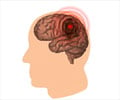
For the research (FPN 38), 192 stroke survivors (average age 70 years) were asked if they liked or did not like art (music, painting, theatre). Quality of life was compared for patients interested in art (105) and patients not interested in art (87).
Patients interested in art had better general health, found it easier to walk, and had more energy. They were also happier, less anxious or depressed, and felt calmer. They had better memory and were superior communicators (speaking with other people, understanding what people said, naming people and objects correctly).
Dr Vellone says: "Stroke survivors who saw art as an integrated part of their former lifestyle, by expressing appreciation towards music, painting and theatre, showed better recovery skills than those who did not."
"In our study the 'art' group of patients showed a comparable clinical picture to the 'no art' group," he adds. "This is important because it means that patients belonging to the 'art' group had a better quality of life independently from the gravity of stroke. The results suggest that art may make long term changes to the brain which help it recover when things go wrong."
Other researchers have shown that listening to our favourite music directly stimulates a feeling a pleasure by releasing dopamine in the brain. Dopamine is the starting point of the so-called gratification circuit that activates oxytocin (the hormone of love) and finally endorphins (the molecules of pleasurable emotions). "Dopamine improves quality of life each time it is released in the brain," says Dr Vellone. "Further research is needed to see if other art forms stimulate dopamine release."
Advertisement
Source-Eurekalert














